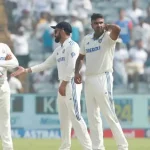The historic Lord’s Cricket Ground was the epicenter of high-octane drama, grit, and heartbreak as England edged out India in a nerve-wracking third Test of the Anderson-Tendulkar Trophy. The match, brimming with iconic moments and individual brilliance, saw England take a 2-1 lead in the five-match series with a 22-run victory. However, the celebration was short-lived. Within hours of the triumph, the International Cricket Council (ICC) slapped England with a two-point deduction in the World Test Championship (WTC) 2025–27 for maintaining a slow over rate, throwing a spotlight on the growing tension between thrilling cricket and regulatory discipline.
The Lord’s Classic: A Test for the Ages
The script at Lord’s unfolded like a timeless drama. A venue steeped in cricketing heritage played host to a riveting encounter, one that ebbed and flowed until the very last ball. Both teams came in with a win apiece, the series finely poised. What followed over five days was a masterclass in Test match theatre.
First Innings Deadlock: 387 Each
Setting the tone for the epic, India and England both posted identical scores of 387 in their first innings. It was a rare occurrence in the modern game and a testament to how evenly matched the sides were.
-
For India, KL Rahul’s gritty century was the backbone of their innings. Battling swing, bounce, and pace, he showcased sublime temperament and shot selection.
-
England replied in kind, led by the master craftsman Joe Root, whose century came with typical finesse and control. Supported by Ollie Pope and Ben Foakes, England ensured parity.
Archer’s Fire, Root’s Resilience
If India’s seamers were relentless, Jofra Archer was electric. Returning from a prolonged injury layoff, he steamed in with hostile spells that rattled India’s middle order in both innings. His sharp bouncer to dismiss Rohit Sharma in the second innings was a defining moment.
In contrast, Root’s assured presence at the crease offered England balance and continuity. The former captain’s ability to absorb pressure and rotate strike was instrumental in England gaining a slight psychological edge heading into the second half.
The Final Chase: Agony and Almost
Set a target of 193 runs, India found themselves in familiar waters—on the cusp of glory with a daunting chase ahead. Early wickets set them back, but their lower-order fightback nearly orchestrated a heist.
-
Ravindra Jadeja once again became India’s fulcrum with the bat. His ability to read the game and farm the strike was crucial.
-
Nitish Kumar Reddy, the debutant, played a valuable hand under pressure, showing maturity beyond his years.
-
Jasprit Bumrah and Mohammed Siraj showcased defiance, adding precious runs.
India clawed their way to 170/9, bringing the required runs to within reach. But it was Shoaib Bashir, England’s young spinner with a fractured finger, who delivered the telling blow—bowling Siraj with a delivery that gripped, bounced, and ricocheted onto the stumps. A cruel, yet poetic end to a ferocious contest.
The Lord’s crowd erupted. England had sealed the Test and taken the lead. But the post-match scenes were laced with bittersweet emotions.
The ICC Verdict: Slow Over Rate Costs England
Even as England basked in their win, the ICC’s post-match assessment dropped a bombshell. England had been found guilty of maintaining a slow over rate, falling two overs short of the requirement, even after time allowances were accounted for.
WTC Point Deduction: A Costly Slip
Under Article 16.11.2 of the ICC WTC playing conditions, teams are required to maintain a minimum over rate. Falling short leads to point deductions, a rule introduced to keep the longest format brisk and competitive.
-
England were penalized 2 WTC points (1 point per over short).
-
Their WTC points tally dropped from 24 to 22.
-
Points Percentage reduced from 66.67% to 61.11%, slipping them to third place in the updated table.
Here’s the latest WTC 2025-27 Points Table:
| Rank | Team | Matches | Wins | Losses | Draws | Points | PCT (%) |
|---|---|---|---|---|---|---|---|
| 1 | Australia | 3 | 3 | 0 | 0 | 36 | 100.00 |
| 2 | Sri Lanka | 2 | 1 | 0 | 1 | 16 | 66.67 |
| 3 | England | 3 | 2 | 1 | 0 | 22 | 61.11 |
| 4 | India | 3 | 1 | 2 | 0 | 12 | 33.33 |
| 5 | Bangladesh | 2 | 0 | 1 | 1 | 4 | 16.67 |
| 6 | West Indies | 3 | 0 | 3 | 0 | 0 | 0.00 |
| — | New Zealand | – | – | – | – | – | – |
| — | Pakistan | – | – | – | – | – | – |
| — | South Africa | – | – | – | – | – | – |
This small but significant penalty could shape the race to the WTC final. In such a compressed points table, every point counts.
Fines and Accountability: Ben Stokes Steps Up
Under Article 2.22 of the ICC Code of Conduct, players are also subject to financial penalties for slow over rates:
-
A 5% match fee fine per over short applies.
-
England players were fined 10% of their match fee.
-
Skipper Ben Stokes accepted full responsibility, pleaded guilty, and avoided a formal hearing.
Stokes, who had just been crowned Player of the Match, exemplified sportsmanship and accountability. Speaking to the press, he said:
“We’re thrilled with the win, but we know the rules. It’s on me to ensure we operate within the framework. We’ll take this on the chin and be sharper in the next game.”
His leadership continues to evolve—not just through dynamic performances but also through transparency and integrity off the field.
The Larger Picture: The Over-Rate Debate
This isn’t the first time slow over rates have marred key Test matches. Teams around the globe have struggled to balance strategic depth, bowling changes, and review consultations with the ticking clock.
While the ICC’s stance remains firm—particularly in the WTC context—several current and former cricketers have questioned whether the penalties are proportionate to the infraction, especially in gripping contests where delays often come from on-field intensity rather than indiscipline.
Former England captain Michael Vaughan tweeted:
“Great game, great win… but docking points for slow over rates in a five-day Test like this? Harsh and unnecessary. Let the cricket breathe.”
Yet the ICC insists that rules must be enforced uniformly to preserve fairness and spectator engagement.
India’s Response: Learnings in Loss
Despite the defeat, India’s performance at Lord’s was full of character. Their top and middle order continue to show signs of stability, and their lower-order contributions were commendable.
-
KL Rahul, returning after injury, remains India’s most consistent Test batter.
-
Jasprit Bumrah’s bowling and batting efforts drew widespread praise.
-
Debutant Nitish Reddy’s temperament could secure him a place for the rest of the series.
Skipper Shubman Gill, still finding his feet in leadership, spoke after the loss:
“We fought till the end, and that’s what matters. The team showed heart. We’ll regroup and come back stronger in Manchester.”
What’s Next: The Series Heads to Old Trafford
The fourth Test begins on July 23 at Old Trafford, Manchester. The stakes have never been higher:
-
England will want to close the series with a win, but over-rate management will now be at the forefront of their tactical plans.
-
India must win to keep the series alive and maintain relevance in the WTC cycle.
There’s every reason to expect another humdinger—fuelled by form, fire, and the fine margins that define Test cricket.
A Win, A Warning
England’s triumph at Lord’s will be etched in memory for its sheer drama and heroism. But the ICC’s decision reminds teams that success on the field must be accompanied by compliance off it. The WTC, while fostering competitiveness, demands professionalism in all facets of the game.
As teams look ahead to the next match and the bigger WTC final down the line, they must walk a tightrope—between intensity and regulation, between instinct and adherence. England, for all their flair, have been served a timely reminder: in this championship race, time lost could be a title lost.
Please check for information on the best betting sites in India – https://selectory.org/best-betting-sites/















